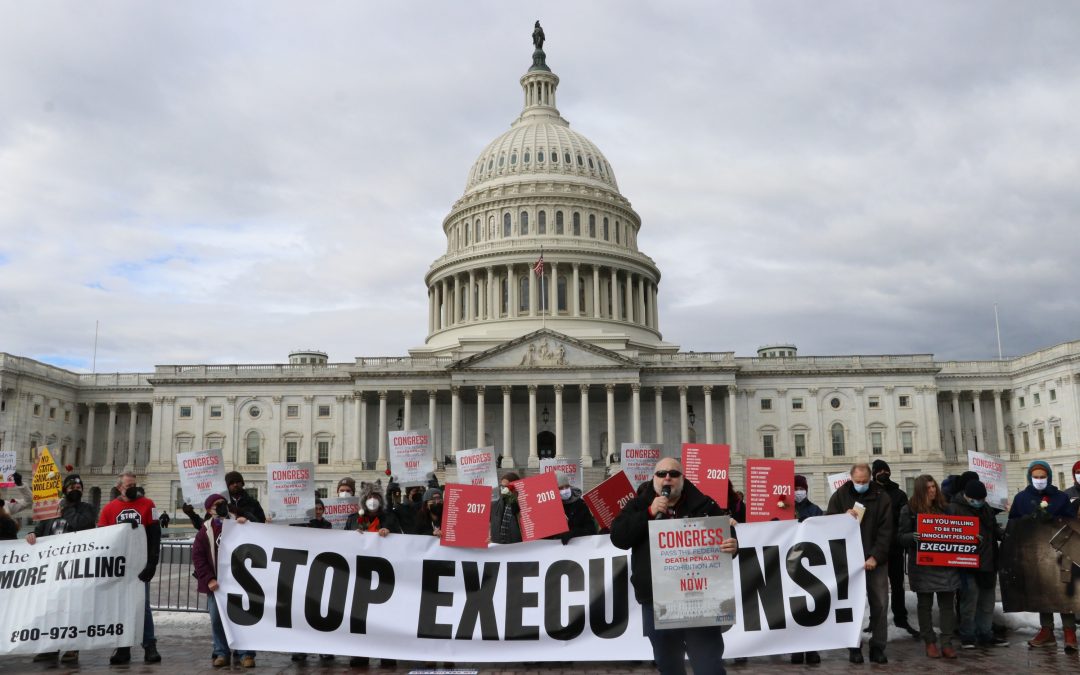WASHINGTON — Police arrested 11 people who were protesting the death penalty outside the Hart Senate Office Building on Monday.
The Abolitionist Action Committee was marking the 45th anniversary of the first execution in the modern era: Gary Gilmore was executed by firing squad on Jan. 17, 1977; he had been convicted of murdering two men in Utah in 1976, and the Supreme Court ruled the death penalty legal that same year. Every five years, activists from around the country gather outside the Supreme Court to protest the milestone. This year, protesters also called on Congress and President Joe Biden to outlaw federal executions.
“We are on the cusp of a nightmare of executions,” said Abraham Bonowitz, the director of Death Penalty Action. “States are realizing that they don’t need to make it pretty with lethal injection; they’re now forcing prisoners to choose between the gas chamber and the firing squad and the electric chair depending on the state.”
Many states have recently experienced difficulty with lethal injection drugs and in March 2021, South Carolina became one of several states that authorizes firing squads or electrocution if lethal injection isn’t available.
Outside the Supreme Court, about 40 demonstrators unfurled a banner that read “Stop Executions” and rang a bell 44 times to represent ??the number of people in federal prisons who are on death row. Protesters included activist and theologian Shane Claiborne, Catholic Worker member Art Laffin, United Church of Christ executive minister Rev. Traci Blackmon, and Sojourners president Adam Russell Taylor.
The group then marched to the Capitol and the Hart Senate Office Building, where 11 of them were arrested for blocking the street.
The protesters called on Congress to pass the Federal Death Penalty Prohibition Act, which would prohibit the imposition of the death penalty as punishment for any federal conviction. The bill would also require that those sentenced to death by the federal government prior to the passage of the bill be re-sentenced.
“We’re here to break the cycle of violence,” said Laffin. “We’re here to break the cycle of hatred and revenge and retribution and to call for restorative justice.”
Rep. Ayanna Pressley (D-Mass.) introduced the bill in the House of Representatives last January.
“State-sanctioned murder is not justice, and the death penalty, which kills Black and brown people disproportionately, has absolutely no place in our society,” she said in January, adding that the federal death penalty “is as cruel as it is ineffective in deterring crime.”
A delegation of protesters also plans to meet virtually with a representative from the White House later this month, according to Claiborne, who serves on the Abolitionist Action Committee’s advisory board.
Biden, a death penalty opponent, pledged during the 2020 campaign that, as president, he would “work to pass legislation to eliminate the death penalty at the federal level, and incentivize states to follow the federal government’s example.”
During the Trump administration, the government resumed federal executions for the first time in 17 years on July 14, 2020.
In July 2021, Attorney General Merrick Garland ordered a moratorium on federal executions pending a review of the Justice Department’s policies and procedures.
Last year, the United States imposed the fewest death sentences and carried out the lowest number of executions in decades, according to the Death Penalty Information Center. According to the Center’s end of year report, 18 people were sentenced to be executed and 11 people were killed.


